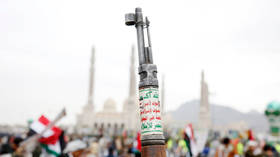EU agrees on Yemen ‘mission’

Foreign ministers of the European Union have reached a tentative agreement to start a naval mission in the Red Sea, EU foreign policy head Josep Borrell announced on Monday, after a ministerial meeting in Brussels.
Germany, France, and Italy have proposed the step in response to requests from the Netherlands, whose merchant shipping has been impacted by the months-long Houthi attacks on vessels linked to Israel.
“We have agreed, in principle, to start the EU mission in the Red Sea,” Borrell said after the meeting, according to the Italian news agency ANSA. “Now we have to work on unanimity as to when (it will start).”
The European External Action Service aims to have the mission established by February 19 and start operations soon afterward, Reuters has reported, citing anonymous diplomatic sources in Brussels.
According to an internal document leaked to several media outlets, the mission would involve “at least three” naval vessels. A diplomatic source told the German outlet Deutsche Welle (DW) on Sunday that the preferred option would be to expand Operation Agenor, the French-led monitoring mission in the Strait of Hormuz.
Spain has made it clear it will not participate in the mission, but Madrid is unwilling to veto it altogether.
The Houthis, which run the western part of Yemen, declared in October that they would interdict any Israeli-linked vessels in the Red Sea, in solidarity with the Palestinians in Gaza.
After the US and UK launched air and missile strikes against the Houthis earlier this month, as part of ‘Operation Prosperity Guardian’, the group declared that any British or American vessels would be legitimate targets as well.
On Monday, the Houthis announced they had attacked merchant vessel Ocean Jazz, a cargo ship often used by the US military to move supplies. The US Central Command has called the claim “patently false,” however.
The EU is acting because it wants to be seen doing something, but doesn’t seem to have thought the operation through, according to Nathalie Tocci, the director of Italy’s Institute for International Affairs (IAI).
“Let’s put this in perspective. The Saudis have been bombing the hell out of Yemen for ten years. Did they actually succeed in weakening the Houthis’ military capacities? No they didn’t,” Tocci told DW on Sunday. Riyadh had been against fighting the Houthis since 2015, without much success, before agreeing to a ceasefire last year.
“So what makes us think some sort of maritime operation, which presumably would have a defensive rather than an offensive purpose, would actually deter in any shape or form?” added Tocci.














